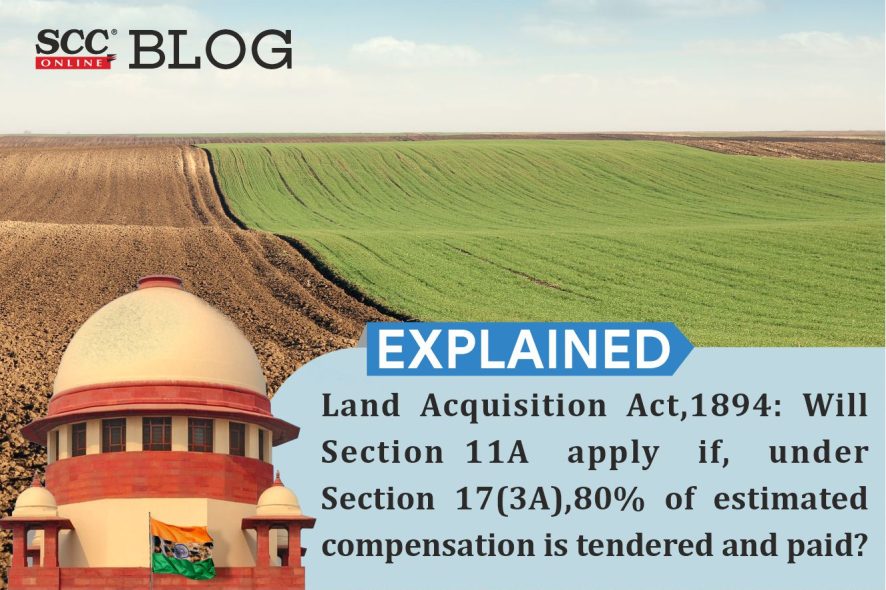Supreme Court: The 3-judge bench of SA Nazeer, AS Bopanna* and V. Ramasubramanian, JJ has explained the scope of Section 11A of the Land Acquisition Act, 1894 and has held that the same shall be applicable to cases in which the acquiring authority has not complied with the requirement of subsection (3A) to Section 17 of Act, 1894 by tendering and paying 80% of the estimated compensation before taking possession since possession in such cases cannot be considered to be taken in accordance with law and the vesting is not absolute.
Further, if the requirement is complied with and possession is taken after tendering and paying 80%, though there is need to pass an award and pay the balance compensation within a reasonable time, the rigour of Section 11A of Act, 1894 will not apply so as to render the entire proceedings for acquisition to lapse in the context of absolute vesting. The right of land loser in such case is to enforce passing of the award and recover the compensation.
Noticing that both Section 11A and sub-section (3A) to Section 17 of Act, 1894 were inserted in Act,1894 to enable the land losers to exercise their right conferred on them, the Court made clear that the benefit of said provision is available only to be invoked by the land loser and cannot be invoked by the acquiring authority to claim lapse by pointing to noncompliance since the ‘vice’ of non-compliance cannot be permitted to be converted into a ‘virtue’.
The Court, however, clarified that if such question arises for consideration in any other case under Act, 1894 or any other enactment relating to land acquisition containing pari materia provisions, this decision is to be applied only prospectively and cases which have attained finality shall not be reopened.
The Court explained the scheme of Section 11A and Section 17 in detail and observed that under Section 17 of Act, 1894, possession is permitted to be taken even before the award is passed. Though such power was absolute earlier, sub-section (3A) was inserted in 1984 imposing a precondition of 80% of the estimated compensation to be tendered and paid to the persons interested in the land.
The word employed in sub-section (3A) of 13 Section 17 of the Act, 1894 is “shall” and it is to be tendered and paid “before taking possession”. Hence, there is no discretion available to the acquiring authority. In fact, the last sentence of sub-section (1) of Section 17 uses the word “thereupon” with respect to vesting. This word “thereupon” is correlated to taking possession and payment in terms of sub-section (3A) is a sine qua non for taking possession. Therefore (1) payment of 80% (2) taking over possession thereafter and (3) vesting of land in the government take place in a sequence. Absent anyone of these in the sequence, the emergency provision fails.
“It is a prerequisite condition to acquire and take possession of the land since such acquisition is permitted by exempting the requirement of the procedure under Section 5A and possession is permitted to be taken prior to an award being passed under Section 11 of Act, 1894.”
It was further explained that the requirement to tender and pay 80% of the estimated compensation before taking possession assumes significance so as to carve out an exception for non-applicability of ‘lapsing’ as contemplated under Section 11A of Act, 1894. This is so, since the terms “vesting absolutely” and “lapsing” cannot co-exist and cannot go hand in hand. Therefore, 80% of the estimated compensation, the payment of which only if tendered and paid, the vesting would become absolute and in such event the consequence of lapsing in respect of absolutely vested land cannot occur and as such, in that circumstance alone Section 11A though applicable will not take effect.
“The right of the land loser would be to enforce passing of award which will include the balance 20% of compensation even if it is beyond two years and get adequately compensated in terms of Section 23 and 34 of Act, 1894 for the delay if any.”
However, when Section 17(1) is invoked but the requirement thereunder which is a pre-requisite condition is not complied, even if possession is taken, such possession cannot be considered as legal so as to vest the land absolutely if the pre-requisite condition for payment of 80% before taking possession is not complied. In such circumstance, by legal fiction it looses its character as an acquisition under Section 17 and since the absolute vesting does not take place, it will lapse if the further process is not complied and the award is not passed within two years from the date of declaration.
But, even when the pre-condition is not complied, if the land loser does not challenge the acquisition and/or taking of possession as illegal, but concedes to the position, the possession taken does not become per-se illegal and the vesting will be absolute and in such event it cannot be considered to have lapsed until the land loser exercises the right.
The Court, hence, concluded that Section 11A though applicable to the cases of acquisition initiated under Section 17(1) of Act, 1894 the consequence of it will not affect the case where the land has absolutely vested on compliance of sub-section (3A) to Section 17 of Act, 1894 and 80% of estimated compensation is tendered and paid.
[Delhi Airtech Services Pvt. Ltd v. State of UP, 2022 SCC OnLine SC 1408, decided on 14.10.2022]
*Judgment by: Justice AS Bopanna
For Appellant: Senior Advocate Sudhir Chandra
For Respondent 1: Senior Advocate Ravindra Kumar
For Respondent 2: Senior Advocate Ravindra Raizada






